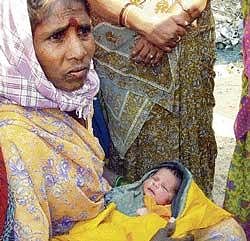

Woman's happiness is future of nation" proclaims the government of Andhra Pradesh at the entrance of its hospital in Devarkonda town in Nalgonda district, about 80 km from here. Nearby is a cradle to receive girl babies unwanted by parents. "Vuyyala" meaning cradle in Telugu is the name of a government programme especially conceived for Nalgonda which gained notoriety for widespread infanticide and selling of Lambada baby girls into inter-country adoption.
Taking a cue from Tamil Nadu, Andhra Pradesh placed the cradle in Devarkonda hospital to encourage parents to leave their unwanted girl babies in the cradle for the government to take care of them, rather than kill or sell them.
Started in 2007 and run in cooperation with the Integrated Child Development Scheme, Vuyyala saw at least 70 babies 'dropped off' of whom 90 per cent were girls. All of them are Lambadas, according to official records.
Even as we were speaking to child rights activists, one of them got an alert on her mobile that a baby girl was dropped in the cradle. As we rushed to the hospital, we met the 'ayah' taking the abandoned new born girl in the searing late summer morning in a bus to Nalgonda town from where after some formalities, the baby is sent to the government run Sisu Vihar in Hyderabad where abandoned children are put up for adoption. The baby, according to an activist of Green Cross, a local NGO that works among the Lambadas, was born early that morning in a 'tanda' or a tribal hamlet, about 30 km away. The father, on the advice of the activist had dropped the baby in Vuyyala.
When we went to the baby's parents' hut in the remote Suddabai Tanda, the mother was in no position to talk to us. She was mentally ill. Her neighbour Jayamma told us that the family was so poor that the new mother was sleeping on the bare floor, unable to afford even a bed sheet. As she was not able to take care of her children two of her sons were admitted in a government hostel while her daughter was sent off with a relative to work as a domestic servant. Her husband, an agricultural labourer, barely manages to feed himself and his wife who gets no medical help for her problem. They even starve sometimes when he gets no work, according to the neighbours.
Child rights NGOs differ on the utility of Vuyyala scheme. Dr Rukmini Rao of Gramya which runs a residential school for Lambada girls in Devarkonda and which was in the forefront of a campaign against the racket of private agencies buying Lambada girl babies and giving them into adoption by westerners, believes that Vuyyala will not serve the larger purpose.
"Our effort should be to make the community responsible for their issues and problems," she said. "The message to the community is that don't throw your baby girls into the gutter but in Vuyyala. It is atrocious that such a mindset is being encouraged," she said. (Newborn girls are known to be thrown in wells and even buried alive.) "The programme will be a success only when those cradles are empty," she said.
Gita Ramaswamy, an activist who has been campaigning against inter-country adoption believes that there is a positive side to Vuyyala. "It is saving lives. If even one life is saved it is to be welcomed. The bottom line is that you can't kill girl babies," she said.
However, it can be only a stopgap measure. The answer is to address the issue of gender discrimination arising from the vicious stranglehold of patriarchy over the community. Equal priority should be given to enhance women's bargaining potential through education and employment. It is doable," she asserted.
Perhaps the notice at the Devarkonda hospital should be changed to "Empowered woman is future of nation."